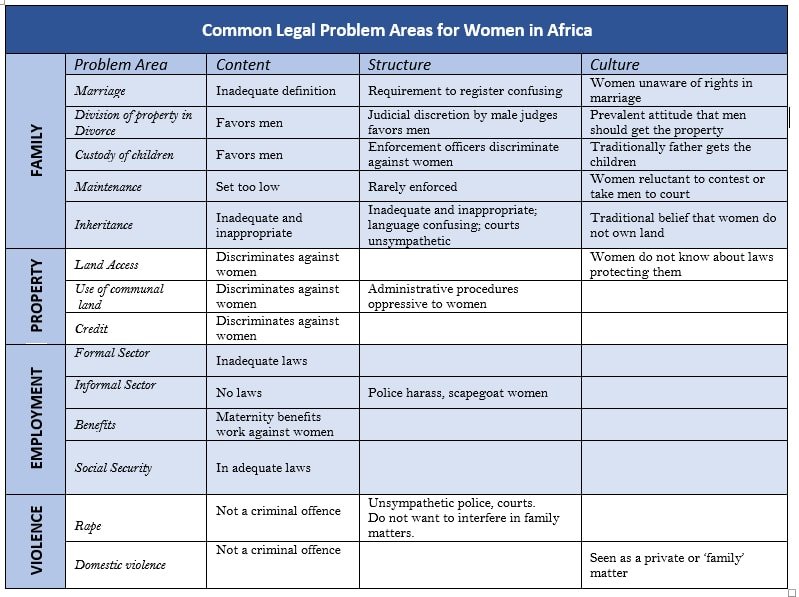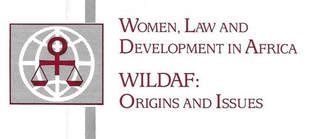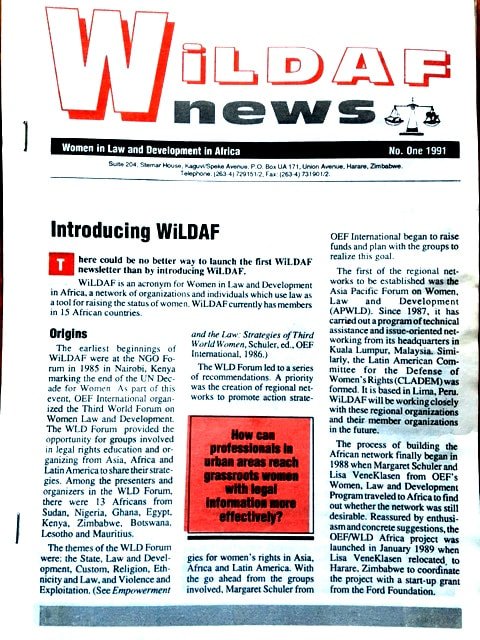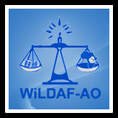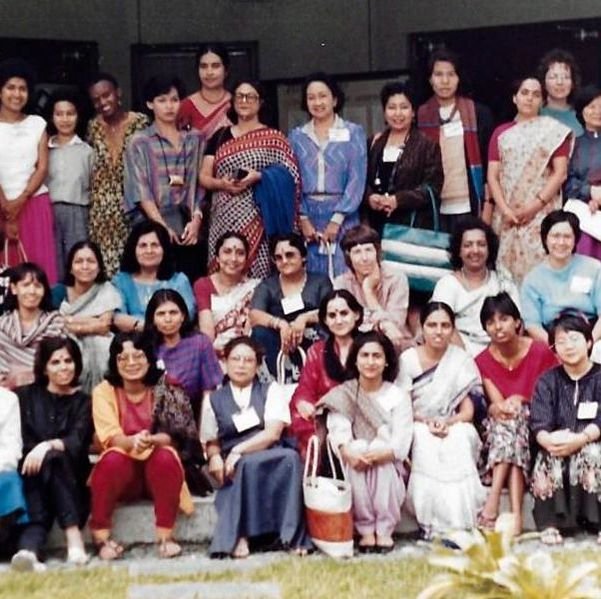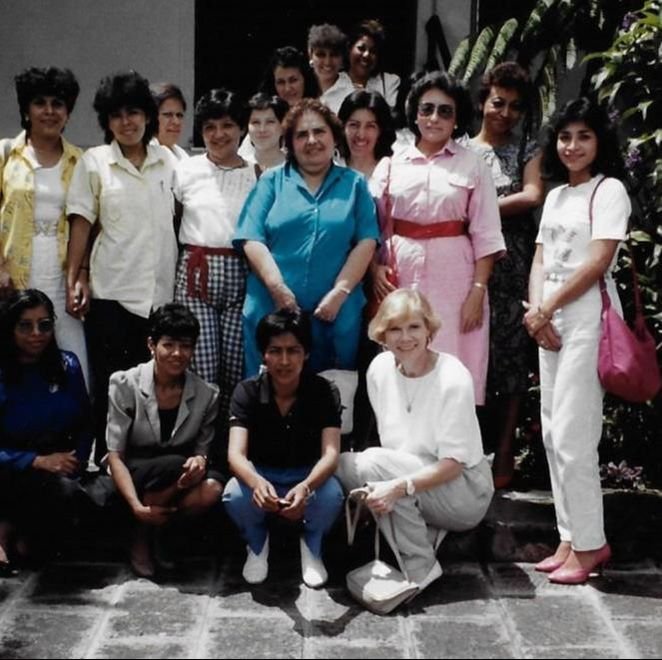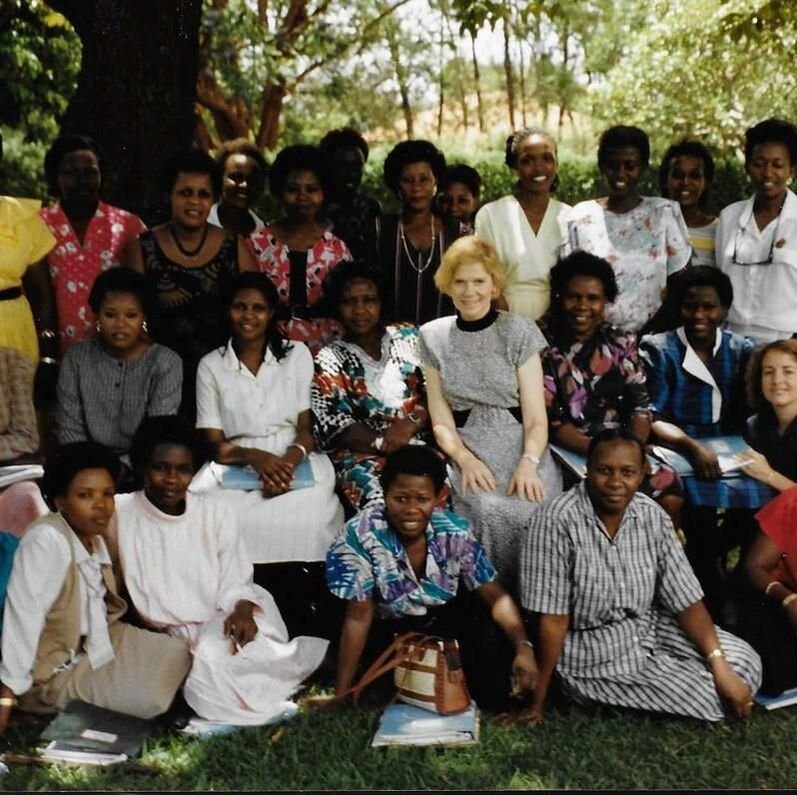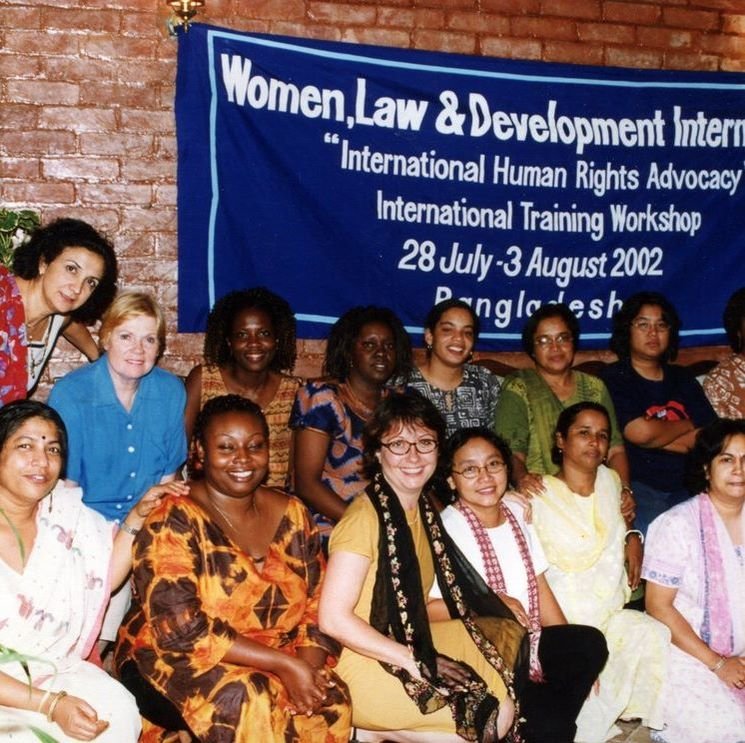
©
Margaret Schuler
Adopted and Maintained by PARTNERS FOR LAW IN DEVELOPMENT (PLD INDIA) as part of the digital Feminist Law Archives.
Adopted and Maintained by PARTNERS FOR LAW IN DEVELOPMENT (PLD INDIA) as part of the digital Feminist Law Archives.
Women in Law and Development in Africa
First planning meeting of the African WLD network, April 1989.
The WLD-Africa Project leading to the establishment
of WiLDAF represented the final step in the process of building WLD regional
organizations. During the development phase of APWLD in Asia, (1986 –
1988) the WLD staff at OEF consisted only of me and my program associate, Robin
Forrest who provided important backup support to my direct work with the APWLD
leadership in Asia. In 1988, Lisa VeneKlasen joined the WLD team in Washington,
initially to assist with work in Latin America and subsequently in Africa. She
relocated to Harare, Zimbabwe in early 1989 to coordinate the WLD Africa
project. At that time, Meg Kimmel replaced Robin as program associate in
Washington. The planning process had the support of Norwegian Development Agency
and the Ford Foundation.
I was especially keen to begin the process in Africa because it was already three years since the WLD forum in Nairobi—the impetus for the work—had taken place. So, it was with eagerness that Lisa and I made a trip to Africa in late 1988 to reconnect with African participants from the Nairobi Forum and make new connections with women who might also be interested in the WLD Africa network. Lisa continued laying the groundwork for the project after her arrival in Zimbabwe in January 1989, through exploratory and planning meetings aimed at identifying the needs and interests of groups and individuals involved in women's rights.
I was especially keen to begin the process in Africa because it was already three years since the WLD forum in Nairobi—the impetus for the work—had taken place. So, it was with eagerness that Lisa and I made a trip to Africa in late 1988 to reconnect with African participants from the Nairobi Forum and make new connections with women who might also be interested in the WLD Africa network. Lisa continued laying the groundwork for the project after her arrival in Zimbabwe in January 1989, through exploratory and planning meetings aimed at identifying the needs and interests of groups and individuals involved in women's rights.
Planning
After our initial consultation period, the WLD-Africa project was
launched with a planning meeting in Harare, Zimbabwe, April 1-3,1989. Eleven
women's rights advocates from Nigeria (Jadesola Akande), Sudan, (Balghis Badri),
Zimbabwe (Felicitas Chiganze, Joyce Kazembe, Sara Longwe, Mary
Maboreke, Amy Tsanga) Ghana (Akua Kuenyehia), Uganda (Anna Magezi) Botswana (Sue
Taten, representing Unity Dow) and Tanzania (Sheribanu Kassim) met to share and
analyze experiences and issues. They reaffirmed the recommendations from the WLD
Forum in Nairobi in 1985, and committed themselves to building a regional network to
"promote strategies that link law and development to empower women."
The meeting focused on the key tasks of information-sharing, analysis, and planning. The group first did a quick inventory of relevant regional networks, organizations, or projects that had some bearing on women, law, and development activities in order to assess the relevancy of forming another organization. This was followed by descriptions of on-going activities in the countries of those represented at the meeting. The group then developed an analysis of the most critical legal problem areas facing women and identified needs and limitations detected in current programs and strategies. Using this information, each participant suggested specific workshop content that would be useful as an activity in her country. Finally, the group outlined the basic concept of regional WLD program for Africa and the purpose and content of a regional conference. Timelines were set and specific responsibilities assigned.
In relation to women's rights activities, the group identified five common features found among the eight countries represented. Women's rights activities were being carried out, in most cases, through the joint efforts of NGOs and government. Law Reform Commissions in several countries provided a bridge between the government and NGOs. The primary approach to making law more accessible to women was through legal aid clinics and legal education. The legal aid clinics are consistently finding that women's legal problems are best solved out of court and require a broad, not solely legal approach. Legal education has primarily concentrated on the production of pamphlets and dissemination of information through talks, although, in some cases, there was a recognition that the organization and empowerment of women require a broader approach. The use of media was not wide-spread. Women's rights initiatives were primarily being carried out by lawyers, although in some countries lawyers were not active at all. The primary focus of most regional networks thus far had been research. Finally. They found that the most effective form of membership in regional organizations seemed to be a flexible type of membership, open to affiliation by groups or individuals, and divided along sub-regional lines (at least at the initial stages).
Critical Legal Problems.
After reviewing the scope and purposes of other relevant regional networks, and of current women and law activities within each country, the participants turned their attention to assessing the most critical legal problems facing women, the needs and gaps in the work. Using the framework developed in Empowerment and the Law for assessing the problem, they then identified the most critical legal issues facing women in relation to the content, structure and culture of the law. The chart below summarizes the findings of this analysis.
The meeting focused on the key tasks of information-sharing, analysis, and planning. The group first did a quick inventory of relevant regional networks, organizations, or projects that had some bearing on women, law, and development activities in order to assess the relevancy of forming another organization. This was followed by descriptions of on-going activities in the countries of those represented at the meeting. The group then developed an analysis of the most critical legal problem areas facing women and identified needs and limitations detected in current programs and strategies. Using this information, each participant suggested specific workshop content that would be useful as an activity in her country. Finally, the group outlined the basic concept of regional WLD program for Africa and the purpose and content of a regional conference. Timelines were set and specific responsibilities assigned.
In relation to women's rights activities, the group identified five common features found among the eight countries represented. Women's rights activities were being carried out, in most cases, through the joint efforts of NGOs and government. Law Reform Commissions in several countries provided a bridge between the government and NGOs. The primary approach to making law more accessible to women was through legal aid clinics and legal education. The legal aid clinics are consistently finding that women's legal problems are best solved out of court and require a broad, not solely legal approach. Legal education has primarily concentrated on the production of pamphlets and dissemination of information through talks, although, in some cases, there was a recognition that the organization and empowerment of women require a broader approach. The use of media was not wide-spread. Women's rights initiatives were primarily being carried out by lawyers, although in some countries lawyers were not active at all. The primary focus of most regional networks thus far had been research. Finally. They found that the most effective form of membership in regional organizations seemed to be a flexible type of membership, open to affiliation by groups or individuals, and divided along sub-regional lines (at least at the initial stages).
Critical Legal Problems.
After reviewing the scope and purposes of other relevant regional networks, and of current women and law activities within each country, the participants turned their attention to assessing the most critical legal problems facing women, the needs and gaps in the work. Using the framework developed in Empowerment and the Law for assessing the problem, they then identified the most critical legal issues facing women in relation to the content, structure and culture of the law. The chart below summarizes the findings of this analysis.
Special Problems of Muslim Women in
Africa. While family issues are shared with other religious and
cultural groups, there are special problems in the case of Muslim women. They
also provide opportunities for action. Among the issues identified are:
level of the audience. Third, the best channels and means of communication must be identified.
They felt it was particularly important for groups/organizations involved in education or legal literacy:
Structural Reform To make the system more accessible to women, participants addressed the need to develop alternative approaches to legal services and press the system to respond by offering the required services. They felt it was important to
This initial assessment motivated the WLD Project over the next phase to focus on:
- Divorce procedures and the absolute right of men to divorce
- Polygamy and right of men to take other wives
- Division of property at time of divorce
- Custody of Children
- Maintenance of the wife and/or the children
- Consent to marriage
- Women's Legal Strategies
level of the audience. Third, the best channels and means of communication must be identified.
They felt it was particularly important for groups/organizations involved in education or legal literacy:
- To train the "communicators" of the message adequately, with special attention to the grassroots.
- To strengthen the skills and organizational structures of groups and organizations that are implementing programs of legal literacy.
- To develop law school curricula and train future lawyers in the area of women's rights.
- To develop activists within various professions and at various levels to take up these issues.
Structural Reform To make the system more accessible to women, participants addressed the need to develop alternative approaches to legal services and press the system to respond by offering the required services. They felt it was important to
- put pressure on the courts to simplify procedures and make them understandable to women.
- Sensitize the courts at all levels (esp. community courts and special tribunals) on women's issues in order to achieve better decisions.
- Work to have more women in the administration of justice.
This initial assessment motivated the WLD Project over the next phase to focus on:
- understanding the most critical legal issues facing women in the region;
- refining and developing the most effective means (strategies and programs) for educating and organizing women to exercise their rights;
- clarifying the kinds of legal and organizational processes that lead to empowerment;
- establishing links at the national and regional levels to expand the influence of individual local programs.
Preparatory Workshops
Between April and February of 1989, Lisa worked closely
with the Country Coordinators and other women's rights advocates in each country
to organize workshops involving a range of women's groups in Uganda, Ghana,
Nigeria, Zimbabwe, Botswana, Tanzania, Zambia and Kenya. The workshops were
facilitated by me and Lisa together or Lisa alone and lasted 2-4 days. They were
designed to expand the skills of organizers and advocates to analyze the nature
of legal problems and develop more effective responses.
All the workshops had a similar design and included six major components: 1) identification of the most critical legal problems facing women; 2) analysis of how the legal system influences those problems; 3) assessment of existing women's programs; 4) non-formal education methods for fostering legal awareness and action at the community level; 5) building a comprehensive strategy for mobilization to influence public or official opinion; and, 6) strengthening collaboration between lawyers and other professionals such as community development workers, academics, etc. and among NGOs and governmental institutions involved in women and the law.
The workshops were participatory, conducted through a combination of brief presentations and small group activities in which participants applied or practiced the skills presented. The WLD conceptual framework was used to analyze how the legal system (encompassing the content, structure and culture of the law) contributes to women's problems or their solution. The same methods for engaging adults in understanding and exercising their rights were introduced and participants tried theater, role plays, and posters as a new way of providing legal education. Since participatory methods are not commonly used at workshops and seminars for professionals or project directors, workshop participants were excited at their potential for generating discussion and making the law relevant to grassroots women. These activities also reaffirmed the need for collaboration between lawyers and others involved in community development.
The workshops led to the development of new strategies and the establishment of country level WLD networks or committees to coordinate their implementation. They also reaffirmed the need for regional networking to reinforce local efforts. At a meeting on December 13th and 14th, the WLD Africa Planning Committee met again to develop a proposal for the establishment of a network, and planned the regional conference where the network proposal would be presented to a wider group of African lawyers and comminity workers.
All the workshops had a similar design and included six major components: 1) identification of the most critical legal problems facing women; 2) analysis of how the legal system influences those problems; 3) assessment of existing women's programs; 4) non-formal education methods for fostering legal awareness and action at the community level; 5) building a comprehensive strategy for mobilization to influence public or official opinion; and, 6) strengthening collaboration between lawyers and other professionals such as community development workers, academics, etc. and among NGOs and governmental institutions involved in women and the law.
The workshops were participatory, conducted through a combination of brief presentations and small group activities in which participants applied or practiced the skills presented. The WLD conceptual framework was used to analyze how the legal system (encompassing the content, structure and culture of the law) contributes to women's problems or their solution. The same methods for engaging adults in understanding and exercising their rights were introduced and participants tried theater, role plays, and posters as a new way of providing legal education. Since participatory methods are not commonly used at workshops and seminars for professionals or project directors, workshop participants were excited at their potential for generating discussion and making the law relevant to grassroots women. These activities also reaffirmed the need for collaboration between lawyers and others involved in community development.
The workshops led to the development of new strategies and the establishment of country level WLD networks or committees to coordinate their implementation. They also reaffirmed the need for regional networking to reinforce local efforts. At a meeting on December 13th and 14th, the WLD Africa Planning Committee met again to develop a proposal for the establishment of a network, and planned the regional conference where the network proposal would be presented to a wider group of African lawyers and comminity workers.
The Founding Conference
The WLD-Africa Regional Conference, "Networking for
Empowerment in Africa" took place February 26 - March 3,1990 in Harare,
Zimbabwe. The site visits, planning, and country workshops laid the groundwork
for the regional conference in two important ways: by clarifying the needs and
obstacles of women's legal rights programs and by facilitating a systematic analysis
of the most critical problems facing women. The dialog and strategy-building
initiated by the workshops stimulated the participants' interest in learning from
the programmatic experiences of women in other African countries. They also gave
individuals from varied backgrounds, disciplines and contexts a common
framework for exchange and networking. The regional conference provided the forum
for consolidating this process and building consensus on the regional
level.
The conference, thus, set out to became a vehicle for the network to develop direct links and connections among African women working to improve women's socio-legal situation, and drawing from a variety of different country and group experiences in designing and implementing strategies, to develop common approaches and actions for improving African women's socio-legal status and setting goals for future regional action.
The conference, thus, set out to became a vehicle for the network to develop direct links and connections among African women working to improve women's socio-legal situation, and drawing from a variety of different country and group experiences in designing and implementing strategies, to develop common approaches and actions for improving African women's socio-legal status and setting goals for future regional action.
WiLDAF
Promoting strategies that link law
and development
to empower women in Africa.
to empower women in Africa.
After more than a year of preparation, participants
representing sixteen countries came together in Harare, Zimbabwe on February 26,
1990 for a week of discussion, comparative analysis of issues and strategies and
decision-making regarding future directions. The Planning Committee set the
participant number at sixty-five delegates to allow for full participation and
productive decision-making. Each country selected its representatives;
delegations ranged from two to six people depending on the level of activity in
a given country. In addition, members of the Asian and Latin American networks
and U.S. advocates were invited to participate and share their experiences.
Shanthi Dairium, an APWLD staff member from Malaysia provided insights about the
Asia region’s challenges and future direction. Silvia Pimentel, from
Brazil represented CLADEM and Elizabeth Dasso from Peru shared the experience of
her organization training grass-roots women as paralegals in the shanty towns of
Lima. Nancy Duff Campbell, from the National Women’s Law Center in
Washington DC, shared the strategies they use in the areas of public education,
research and law reform. Numerous observers from Zimbabwe, including the donor
community, also
participated.
Themes
The week's discussions covered four substantive themes:
Establishment of WiLDAF
The final day and a half of the conference was dedicated to regional networking. Because each delegation had discussed the proposal for the establishment of the network locally prior to the conference, discussion was brief and approval unanimous. The debate over the venue of the regional secretariat and the number of countries to be represented on the Steering Committee of the new organization was more contentious. It was agreed that all of the countries at the conference would have a representative on the committee and Harare was chosen by a narrow margin to be the location of the regional office. It was also decided that a comprehensive organizing project would be carried out in Francophone Africa to provide that sub-region the same opportunity for analysis and strategizing. Once completed, a sub-regional office would be established in Abidjan, C6te d'Ivoire.
Plan of action.
After the conference concluded, the new Steering Committee refined the plan of action for the development of WiLDAF and set its programmatic priorities as:
The task force met again in May 1990 to refine the regional program and develop a fundraising strategy. They decided that the regional secretariat would be established and staffed by the end of 1990. This would provide WiLDAF the institutional base it would need to fulfill its purpose of fostering continued discussion and action for women's rights in Africa.
Themes
The week's discussions covered four substantive themes:
- Fostering rights awareness and action among grassroots women,
- Organizing around legal and policy reform,
- Access to and oontrol of economic resources, and
- Violence toward women.
Establishment of WiLDAF
The final day and a half of the conference was dedicated to regional networking. Because each delegation had discussed the proposal for the establishment of the network locally prior to the conference, discussion was brief and approval unanimous. The debate over the venue of the regional secretariat and the number of countries to be represented on the Steering Committee of the new organization was more contentious. It was agreed that all of the countries at the conference would have a representative on the committee and Harare was chosen by a narrow margin to be the location of the regional office. It was also decided that a comprehensive organizing project would be carried out in Francophone Africa to provide that sub-region the same opportunity for analysis and strategizing. Once completed, a sub-regional office would be established in Abidjan, C6te d'Ivoire.
Plan of action.
After the conference concluded, the new Steering Committee refined the plan of action for the development of WiLDAF and set its programmatic priorities as:
- 1) providing training similar to that provided by the workshops;
- setting up an information exchange system; and
- creating an emergency response network to mobilize around serious violations of womens rights.
The task force met again in May 1990 to refine the regional program and develop a fundraising strategy. They decided that the regional secretariat would be established and staffed by the end of 1990. This would provide WiLDAF the institutional base it would need to fulfill its purpose of fostering continued discussion and action for women's rights in Africa.
|
Conference Participants
WEST AFRICA Ghana Akua Kuenyehia, FIDA-Ghana Law Faculty, University of Ghana Emelia Adjepong, FIDA-Ghana Dorcas Coker-Appiah, FIDA-Ghana Chris Dadzie, FIDA-Ghana Manan Adwoa Addo-Kufuor, FIDA-Ghana Doe Tsikata, FIDA-Ghana, Law Faculty, University of Ghana Nigeria Jadesola Akande, Vice Chancellor Legos State University Ayodele Oyajobi, Lagos State University Bisi Olatem-Olagbegi, FIDA-Nigeria Tokunbo Ige, Legal Research and Development Centre Jumoke Amifowoshe, FIDA-Nigeria Priscilla O. Kuye, National Council of Women's Societies Stella Omiyi, FIDA-Nigeria SENEGAL Seny Diagne Ba, Young Lawyers Association Salimata Sow Maty Diaw, Ministere du Developpment Social Cote d'Ivoire Jacqueline Oble-Lohoues, University of Cote d'Iviore Hortense Kouassi, University of Cote d'Iviore EAST AFRICA Sudan Asma Mohamed A'Haleem, Lawyer in Private Practice Boran Badri, AHFAD Women's University Dorwo Sisi Sakina, AHFAD Women's University Nahid A/Rahim Shaddad, Attomey Generalas Chambers Siham Samir Awad, Faculty of Law, Khartoum University Tanzania Nakazael Lukio Tenga, Legal Aid for Women (SUWATA) Victoria Mandan, Legal Aid for Women (SUWATA) Marjorie Mbilinyi, University of Dar es Salaam Christina Sintala, Legal Aid for Women (SUWATA) Fatma Maghimbi, Legal Aid for Women (SUWATA) Uganda Florence Butegwa, FIDA-Uganda Makerere University Margaret Oumo Oguli, FIDA-Uganda Miria K Matembe, Action for Development Margaret Kikampikaho, Action for Development Jennifer Okiunu Wengu, Ministry of Women in Development Joyce Abaliwano, National Council of Women Kenya Betty Nafuna Wamalwa, Researcher Janet Kabeberi-Macharia, Law Faculty, University of Nairobi Anne Kyalo, Public Law Instítute Faiza Ngatia, Women's Bureau Victoria Wambui Muchai-Kattambo, Kenya Law Reform Commission Kivutha Kibwana, Law Faculty, University of Nairobi |
SOUTHERN AFRICA Zambia Lillian Mushota, Women's Law in Southern Africa (WLSA) Research Project Sara Hlupekile Longwe, WLSA Research Project Martina Chuulu, WLSA Research Project Christine N'gambi, , WLSA Research Project Tsitsi V. Himunyanga-Piri, Law Association of Zambia Mozambique Isabel María Aleada Fadez Cortesao Casimiro, Centre for African Studies Eduardo Mondlane University Ana María Pessoa Pereira da Silva Pinto, Judge, Ministry of Justice Botswana Lebogang Letsie-Taole, Emang Basadi, Joyce Anderson, Women's Affairs Unit, Department of Culture Mpho Makhema, Botswana Council for Refugees Eleanor Gabaake, Botswana Council of Women Ruth Motsete, Botswana Christian Council/Emang Basadi Lesotho Sasha Monyamane, Federation of Women Lawyers National University of Lesotho Likhapha Mbatha, WLSA Research Project Swaziland Mary Joyce Doo Aphane, University of Swaziland Stukie Patricia Motsa, Council of Swaziland Churches Zimbabwe Sheelagh Stewart, Musasa Project Amy Shupikai Tsanga, Harare Legal Projects Centre Everjoyce Win, Women's Action Group Joyce Kazembe, Southern Africa Political Science Association Mary Maboreke, Law Faculty, University of Zimbabwe Constance Mabusela, Zimbabwe Council of Churches Elizabeth Gwaunza, WLSA Research Project Country Coordinator Alice Armstrong, WLSA Research Project Director Mauritius Shirin Aumeeruddy-Cziffra,** Member of Parliament INTERNATIONAL PARTICIPANTS AND OBSERVERS Silvia Pimentel, Pontificial Univ. Católica Sao Paolo, Brazil Elizabeth Dasso, Legal Program Coordinator, Perú Mujer Lima, Perú Shanthi Dairiam, Programme Associate, APWLD Kuala Lumpur, Malaysia Nancy Duff Campbell, National Women's Law Center Washington, D.C., USA Anne Hellum, Women's Law Course, University of Oslo, Norway Willie Campbell, President, OEF International Washington, D.C., USA OEF/WLD Margaret Schuler, WLD Director Lisa VeneKlasen, WLD Africa Coordinator Meg Kimmel, WLD Program Associate |
Continue on to WLD International


